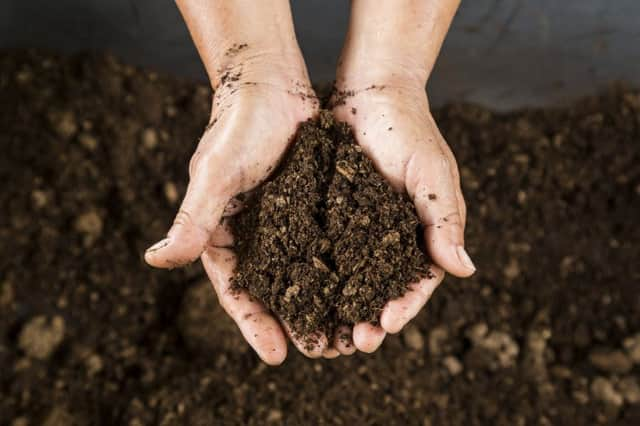Scottish research finds soil crucial to climate change fight


A team at Edinburgh University and Aberdeen University the have produced a study which suggests natural surfaces could store an extra eight billion tonnes of emissions, helping to limit the impact of climate change.
The analysis indicates that adopting the latest technologies and sustainable land use practices on a global scale could also allow gases to be stored in farmland and natural wild spaces.
Advertisement
Hide AdAdvertisement
Hide AdGrowing crops with deeper root systems, using charcoal-based composts, applying sustainable agriculture practices and restoring drained peatlands could help soils retain an amount of carbon, equivalent to a significant proportion of annual emissions released by the burning of fossils fuels.
The role that soils could play in efforts to combat climate change has until now been largely overlooked, owing to a lack of effective monitoring tools however advances in technology have enabled researchers to work out their full potential.
The study states that coordinated efforts involving scientists, policymakers and land users are key to achieving any meaningful increase in soil storage of greenhouse gases and resources should be provided to help reduce the environmental impact of farms.
Community-based initiatives could be used to help to overcome cultural barriers, funding issues and monitoring challenges to achieve a global increase in soil uptake.
Previous research shows that soils currently store around 2.4 trillion tonnes of greenhouse gases, which are stored underground as stable organic matter.
Professor Pete Smith, of the Institute of Biological and Environmental Sciences at the University of Aberdeen, said: “Soils have probably been overlooked as you cannot see the large carbon stocks they contain, whereas you can see trees growing and getting bigger. It is also difficult to easily measure changes in soil carbon, as changes are slow and we are trying to measure a small change against a large background. But after International Year of Soils in 2015, and the French Government’s initiative to increase soil carbon stocks to tackle climate change agreed at the Paris climate summit last December, soils are now firmly on the climate change agenda.”
Professor Dave Reay, of the University of Edinburgh’s School of GeoSciences, added: “In the fight to avoid dangerous climate change in the 21st Century we need heavyweight allies. One of the most powerful is right beneath our feet. Soils are already huge stores of carbon and improved management can make them even bigger. Too long have they been overlooked as a means to tackle climate change. Too often have problems of accurate measurement and reporting stymied progress towards climate-smart soil management. With the surge in availability of ‘big data’ on soils around the world, alongside rapid improvements in understanding and modelling, the time has come for this big-hitter to enter the ring.”
